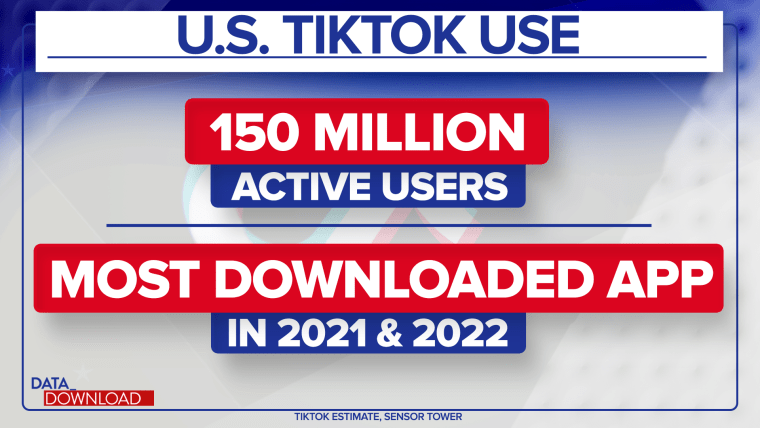WASHINGTON — TikTok CEO Shou Zi Chew was on Capitol Hill last week to testify before Congress and defend the social media platform. After years of speculation, Washington has started talking seriously about heavily regulating or banning the application in the U.S., citing security concerns over how its Chinese ownership handles U.S. user data.
TikTok is not just another social media platform. Its global release was as recent as August 2018, and it has become a web phenomenon, with skyrocketing audience numbers and ad revenue. And should Congress push forward with banning it, the move could have broad impacts economically and politically.
The audience numbers tell much of the story.
In 2020, only two years after its global launch, TikTok said it had 100 million users in the U.S. Last week it announced the figure had climbed to 150 million. That represents about 45% of the 332 million men, women and children who make up the U.S. population — exponential growth in less than five years — and a huge audience ready to tune into any online discussion.
The company also says the app has been downloaded 210 million times in the U.S.
But TikTok’s biggest difference from other social media is not remarkable audience growth; it is remarkable revenues. The young app is bringing in billions in ad dollars and giving some content creators the ability to earn income.

In 2020, TikTok generated $780 million in advertising revenue in the U.S., not bad for a relatively new app in a pandemic. But in 2023, it is expected to produce about $6.8 billion in ad money, according to the research firm eMarketer.
That kind of growth shows TikTok’s power as an advertising platform. But beyond its ability to make money for itself, it has gotten attention from “content creators,” who praise its ability to become a revenue source.
To be clear, TikTok itself is not the source of revenue for those people. It has a Creator Fund that pays out 2 to 4 cents for every 1,000 views a post generates. Do the math and you will see that even a post that generates 1 million views (a very successful post) would lead to only about $20 to $40 in earnings from the company.
The real money comes from sponsorship. After all, if you can get 1 million views of anything online, you have got power — and you can charge for it. A report from the firm IZEA shows a single post from an influencer on social media can yield thousands of dollars in sponsorship money, depending on the size of the audience.

For the smallest influencers, “nano-influencers” with up to 9,999 followers, the price for a sponsored post averages about $1,105. And on the top end, “celebrity influencers,” those with a million or more followers, charge about $6,000 on average for a single post, according to IZEA.
And then there are the top people and accounts on TikTok who are making millions from their social media stardom. For instance, Charli D’Amelio, who has nearly 150 million followers, parlayed her social media stardom into an estimated $17.5 million income last year from a variety of sources. She started her TikTok career posting dance videos in 2019.
Taken together, TikTok’s audience and revenue numbers suggest a pretty strong constituency, but a look at some recent polling suggests there might be some room for congressional action. The partisan differences of opinion over TikTok are somewhat muted.
A poll from The Washington Post last week found that TikTok users, who tend to be younger, also are more likely to identify as Democrats but not remarkably so.

About 43% of Democratic poll respondents say they use TikTok, while only 33% of Republicans said the same thing. That means a majority of people in each party are not TikTok users, which also means they are probably less likely to fight for the app.
Furthermore, majorities of Democrats and Republicans say they are concerned that the platform’s parent company is based in China. More than 6 in 10 Democrats and nearly 8 in 10 Republicans say TikTok’s Chinese ownership leads to some apprehension.
When it comes to an outright ban, some partisan differences emerge, but there are signs that the left/right disagreement could be bridgeable.

A slim majority of Republicans, 51%, say they favor a ban, while only a third of Democrats, 32%, say they do. But much smaller numbers in both parties say they oppose a ban — 22% among Republicans and 28% among Democrats.
That leaves a large group of Democrats and Republicans who are “not sure” about a ban. More than a quarter of Republicans and a whopping 40% of Democrats fall into that group.
The numbers indicate that a large group of voters is up for grabs in the debate or, at least, willing to listen to arguments from both sides. And in the U.S. in 2023, that is something of a rarity.
In other words, the debate in Washington over TikTok in some ways is really just beginning. A lot of Americans will be tuning into the discussion in the coming weeks, and what they decide may be crucial to the fate of the platform — and to the larger conversation of Washington’s role in regulating social media.







